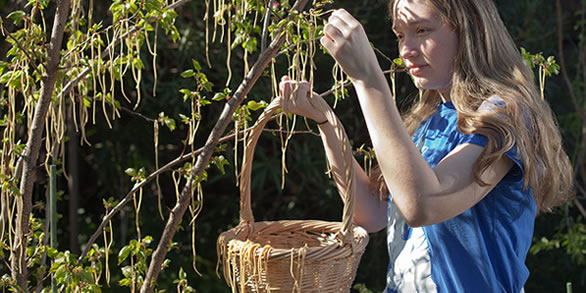The following is the complete text of a BBC Panorama broadcast, written by David Wheeler, narrated by Richard Dimbleby, and with the title above:
It is not only in Britain that spring, this year, has taken everyone by surprise. Here in the Ticino, on the borders of Switzerland and Italy, the slopes overlooking Lake Lugano have already burst into flower at least a fortnight earlier than usual.
But what, you may ask, has the early and welcome arrival of bees and blossom to do with food? Well, it is simply that the past winter, one of the mildest in living memory, has had its effect in other ways as well. Most important of all, it’s resulted in an exceptionally heavy spaghetti crop.
The last two weeks of March are an anxious time for the spaghetti farmer. There is always the chance of a late frost which, while not entirely ruining the crop, generally impairs the flavour and makes it difficult for him to obtain top prices in world markets. But now these dangers are over and the spaghetti harvest goes forward.
Spaghetti cultivation here in Switzerland is not, of course, carried out on anything like the tremendous scale of the Italian industry. Many of you, I am sure, will have seen pictures of the vast spaghetti plantations in the Po valley. For the Swiss, however, it tends to be more of a family affair.
Another reason why this may be a bumper year lies in the virtual disappearance of the spaghetti weevil, the tiny creature whose depredations have caused much concern in the past.
After picking, the spaghetti is laid out to dry in the warm Alpine air. Many people are very puzzled by the fact that spaghetti is produced in such uniform lengths. This is the result of many years of patient endeavour by plant breeders who suceeded in producing the perfect spaghetti.
Now the harvest is marked by a traditional meal. Toasts to the new crop are drunk in these boccalinos, then the waiters enter bearing the ceremonial dish. This is, of course, spaghetti — picked early in the day, dried in the sun, and so brought fresh from garden to table at the very peak of condition. For those who love this dish, there is nothing like real home-grown spaghetti.




